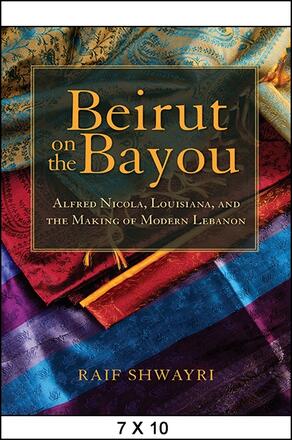
Beirut on the Bayou
Alfred Nicola, Louisiana, and the Making of Modern Lebanon
Alternative formats available from:
Tells the story of Lebanese immigrant Alfred Nicola, the fortune he began building as a peddler in Louisiana, and the family that founded Al-Kafaat University, an iconic institution serving the underprivileged and disabled of Lebanon, through two centuries of unrest in the Middle East.
Description
Raif Shwayri begins his family's story with his grandfather Habib Shwayri's arrival at Ellis Island in 1902. Having left Beirut, then a harbor city on the Syrian coast of the Ottoman Empire, only weeks before, he took the name Alfred Nicola and made his way to relatives in New Orleans. There, he began peddling down the Bayou Lafourche, befriending the communities living alongside the water and earning the nickname "Sweet Papa" for his kindness and generosity. When he returned home to Lebanon in 1920, he invested the money he had made, from years of peddling, in real estate and died a wealthy man in 1956. After his death, his youngest son, Nadim (Raif's father), turned his part of the inheritance into an endowment that started Al-Kafaàt, an iconic and unique institution in Lebanon that serves the handicapped and underprivileged.
Alfred Nicola's story, like the story of Lebanon itself, begins farther back in history. In its account of centuries of Ottoman rule, decades of colonial occupation, and years of internal political strife and civil war, Beirut on the Bayou intertwines a family narrative with the story of a people, of Lebanon in the making. From the Fertile Crescent that was Syria to the Crescent City that is New Orleans, the saga of the Shwayri family reflects the experiences of those Lebanese who walked the path of immigration to the United States, as well as those who stayed behind—or returned—to help forge a nation.
Raif Shwayri is a graduate of King's College London and the University of Wales, a recipient of the John W. Ryan Fellowship for International Education awarded by the State University of New York, and has served as CEO of Al-Kafaàt Foundation and a trustee of AL KAFAAT UNIVERSITY in Lebanon.
Reviews
"Courage, ambition, and love of words. Raif Shwayri has it all at once. " — L'Hebdo Magazine
". ..a fascinating story. " — Voice of America News
"Beirut on the Bayou weaves together the fascinating story of a family with roots in both Lebanon and, more recently, in Louisiana. Along the way, we learn more about the history of the Middle East, the tragedy of the Lebanese civil war, and the remarkable development of the Al-Kafaàt Foundation and educational institutions. Raif Shwayri successfully combines personal stories with grand history, all in a compelling voice and an entertaining style. " — James Ketterer, Bard College
"Well written and charming at times, this book traces the history not only of Lebanon's constant 'realpolitik' turmoil but also that of the enclave of humanitarianism in Al-Kafaàt. Raif Shwayri argues, somewhat wistfully—but at the same time, admirably—that someday and slowly, humanity will win out against violence. " — Eugene Paul Nassar, Director and Founder, The Ethnic Heritage Studies Center, Utica College